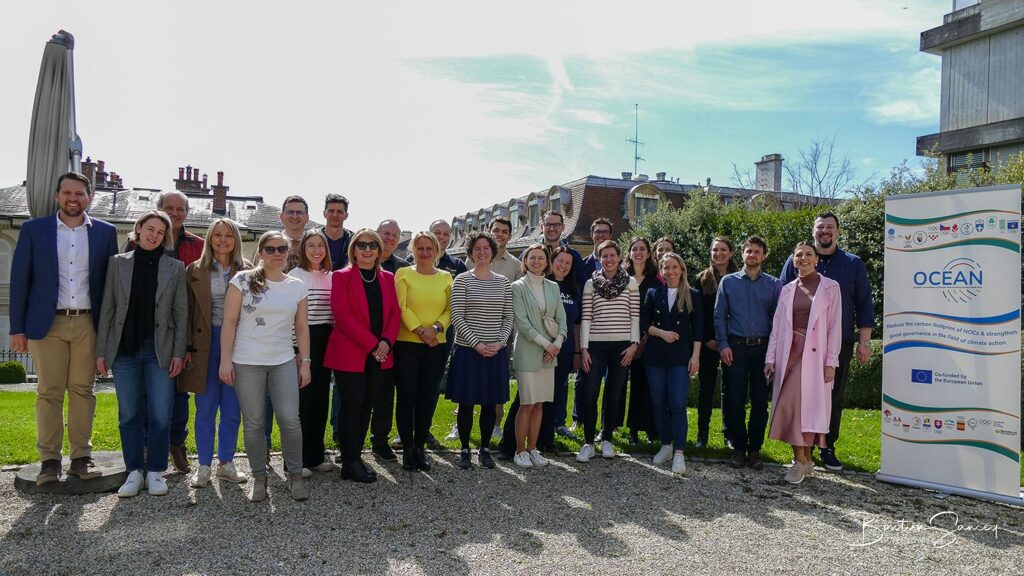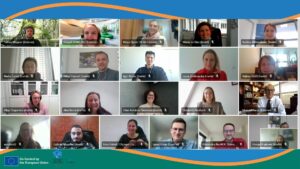The 18 Climate Action Officers engaged in the OCEAN Project started to develop their NOC’s carbon footprint reduction strategy, during a 3-day meeting in Lausanne.
From 18 to 21 March, the Climate Action Officers from the 18 partner National Olympic Committees (NOC) met in Lausanne to assess the progress made and acknowledge the first successes, one year after the launch of the OCEAN project (Olympic Committees of Europe Approaching Carbon Neutrality).
The 18 Climate Action Officers discovered their organisation's carbon footprint after working together with the Öko-Institut on the measurement over the last twelve months. It allowed them to understand their main sources of emissions and to engage in several discussion rounds with the Öko-Institut and Julie Duffus, from the IOC, on how NOCs can move forward in their transition and join the UN Sports for Climate Action Framework. After learning about the main steps of the carbon reduction process, the NOCs’ Climate Action Officers reflected on potential objectives to set and measures to take.
Jon Wyatt’s shared experience as Sports Director at the International Hockey Federation (FIH), managing his organisation's sustainability department gave the OCEAN Consortium valuable information to consider on how to manage the process of implementing a carbon reduction strategy. On this basis, Climate Action Officers were fully equipped to start drafting their carbon footprint reduction strategy.
The results of the NOCs’ carbon footprint measurement will be shared publicly in the course of this Spring, following which the Online Tool for carbon footprint measurement will be revealed to the public at the end of the year. In the meantime, Climate Action Officers are to finalise their NOC’s carbon footprint reduction strategy. The OCEAN Project will conclude in April 2025.

The third Consortium Call took place on January 23. The EOC EU Office organised this online conference to set up a feedback session on the various actions that have been implemented since the second Consortium Call in November and to give a summary of the tasks that would be coming up.
The Öko-Institut has presented the progress made in collecting data from each NOC. It should be submitted, reviewed and finalised before the next step of the OCEAN project, scheduled in Lausanne at the ANOC and IOC Headquarters from 18 to 21 March. Module 3 of the Training Course aims to enable NOCs to understand their carbon footprint, using the data analysis provided by the Öko-Institut and thereby start to elaborate a carbon reduction strategy.
In the meantime, Climate Action Officers will be asked to share some examples of good practices that they may have already implemented within their organisation.

The OCEAN project is moving forward with the organization of a 2nd Seminar and the 1st Consortium Call. These two events were designed to bring further knowledge about the Carbon measurement process to the partners, but also to gather their feedback on it. Moreover, the members received additional information about external project binding together sport and environmental issue.
On the 19th of September the 2nd Online Seminar of the Ocean project dedicated to the Carbon Footprint measurement took place. This meeting led by the Öko Institut had the objective to refine and precise the criteria which will be used in the measurement of the NOCs’ carbon footprint and collect feedback on potential difficulties Climate Action Officers are facing during the data collection phase.
The project is now entering a new phase with the full completion of the measurement tool by the NOCs. The Öko Institut presented the tool they are currently designing and collected the partners’ views on potential supplementary criteria to define with precision their carbon consumption.
Additionally, partners received a presentation from the Paris 2024 Organising Committee and CNOSF team. The emphasis was purposefully oriented toward the sustainability axe of the forthcoming games and the reflection which takes place months in advance to organize a sustainable event. With that objective in mind the French Ministry of sport, in collaboration with ADEME (Environmental and Energy Control Agency), the CNOSF and the Organizing Committee Paris 2024, developed an instrument able to easily estimate the carbon footprint of manifestations: The Climate Coach for Events.
Another event punctuated the OCEAN project agenda as on the 20th of September was held the first consortium call. This online meeting was led by the EOC EU office in order to establish a first feedback session on the different actions already initiated and provide an overview of upcoming tasks. The date and speaker of the October sessions was shared. Lina Taylor, a former Olympian and currently Climate Coach will be in charge of this session.
Afterwards, the discussion moved to the expectations and challenges faced by the consortium members in the implementation of the carbon footprint measurement (time required and specific methodology applied). The next step of the OCEAN project is scheduled to take place during the month of October with the beginning of the Module 2.2. Climate Action Officers will now start the complete carbon footprint measurement of their organization.

